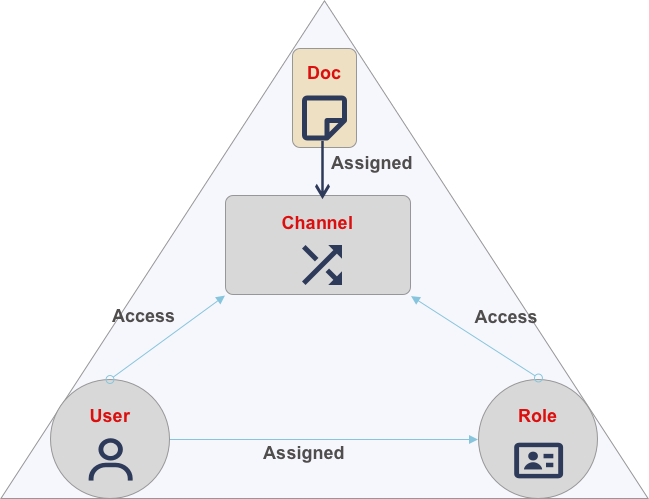Access Control Model
An introduction to access control in Sync Gateway
Related Concepts: Access Control Model | Channels | Roles | Sync Function | Users
Concept
You control document access by routing it to a channel and by making that channel accessible to the users or roles you want to be able to access documents of that type.
Model
In the Couchbase Mobile ecosystem access to documents is governed by three key entities: users, roles and channels.

Conceptually, the channel can be considered as a tag associated with a document. Every document processed by the Sync Gateway is assigned to a channel (user-defined or system-defined). A channel is the fundamental way to segregate documents and for enforcing access control.
Every Sync Gateway user is granted access to zero, one or more channels. It is the channels membership that determines the documents users can access — as illustrated in Access Control Model
A Sync Gateway role is a way of logically grouping users. Like the channel, a role is granted access to zero, one or more channels.
A user can only read documents that are in at least one of their assigned channels; whether directly or as part of an assigned role.
Sync Function Examples
Couchbase Sync Gateway defines a Sync Function at the collection level.
Defining at this level helps simplify data management and improve data reliability.
Each collection in the system allows for only one Sync Function, which enables the specification of Access Control rules.
function (doc, oldDoc, meta) {
channel(CollectionName);
}Here the function then calls the channel and passes in the name of the collection (CollectionsName) as an argument.
By default, every document in the collection is automatically assigned to a channel with the same name as the collection. This system automatically creates a channel with the collection’s name. The assignment of all documents to the collection channel is functionally similar to assigning them to the Star Channel.
To override this, use a custom sync function or a Specified Default Sync Function.
function (doc, oldDoc, meta) {
channel(doc.channels);
}Here is the default Sync Function when you have upgraded; it remains the same as the previous version.
Context
You control document access by routing it to a channel and by making that channel accessible to the users or roles you want to be able to access documents of that type.
Sync Gateway
All users can implicitly access any document in the public channel. In addition, there can be user-defined channels that users can be assigned to.
Once a user is granted access to a new channel, the next replication pull request from the client will retrieve all documents to which the user now has access.
Revoking access to a channel means that users who previously used the channel to get replicated documents will no longer see any synced updates.
Note that access grants neither confer, nor constrain, the type of access. Instead you can explicitly implement write access controls within the Sync Function; perhaps restricting updates to specific users or roles — for more on this see Control Write Access.
Couchbase Lite
By default, Couchbase Lite gets all the channels to which the configured user account has access. Optionally, a Couchbase Lite "pull" replication can also specify a comma-separated list of channel names to receive documents from. In this case, the replication from Sync Gateway will only pull documents tagged with those channels. Client apps can use this ability to intelligently sync with a subset of the available documents from the database.
Channel Access Revocation
|
3.0 Breaking Change
Whenever a user loses access to a channel (or channels) all document in the channel(s) are auto-purged from local Couchbase Lite databases.In Sync Gateway 2.x these documents remain in the local database on channel access loss. |
Users may lose access to documents for many reasons, including:
-
The User loses direct access to channel
-
The User is removed from a role
-
A role the user belongs to is revoked access to channel
By default, when a user loses access to a channel, the next Couchbase Lite Pull replication auto-purges all documents in the channel from local Couchbase Lite databases (on devices belonging to the user) unless they belong to any of the user’s other channels — see: Table 1.
| System State | Impact on Sync | |
|---|---|---|
Replication Type |
Access Control on Sync Gateway |
Expected behavior (auto-purge enabled- default) |
Pull only |
User revoked access to channel. Sync Function includes |
Previously synced documents are auto purged on local |
Push only |
User revoked access to channel. Sync Function includes |
No impact of auto-purge Documents get pushed but will be rejected by Sync Gateway |
Push-pull |
User revoked access to channel Sync Function includes |
Previously synced documents are auto purged on Couchbase Lite. Local changes continue to be pushed to remote but are rejected by Sync Gateway |
Provisioning
-
Channel — the channels topic discusses how channels are created and how documents can be assigned to channels.
-
User — the user topic discusses provisioning of users and providing users access to channels.
-
Role — the role topic discusses roles, assignment of users to roles created and providing roles access to channels.